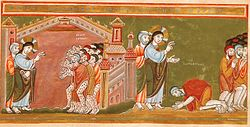“Bah, humbug!”
That phrase is almost as
ubiquitous as “Merry Christmas.” It’s the grouchy epithet spewed out of the
snarled lips of the greatest miser in literary history, Ebenezer Scrooge. With
the singular exception of the story of Our Lord’s nativity, Charles Dickens’
ghostly yarn, A Christmas Carol, the
story of the lonely, covetous, ill-tempered capitalist is probably my favorite
Christmas story—and, possibly, one of my
favorite stories in all English literature.
I first encountered A Christmas Carol in junior high, and I
guess I’ve seen every movie version of it ever made and quite a few stage
adaptations. I played the role of Scrooge myself when I was in high school. I
remembered I had about a half pound of greasepaint[i] on my face to create
Scrooges hollows and frown lines, and my hair was sprayed white. Decades later I
played the role again in a charity production for our Lutheran Social Ministry
Organization Feast of Justice. By that time I didn’t need the greasepaint or
the white spray.
Dickens wrote his Christmas
novella in 1843just as England was experiencing something of a renaissance in
the observance of Christmas. Hitherto, Christmas was just another Christian
feast day observed in the Anglican Church like Epiphany and Pentecost. Its more
festive aspects were mostly observed in rural communities; however, with the
German influence of Prince Albert on Queen Victoria, it was becoming a “thing”
with the more fashion-conscious Brits.
The juxtaposition of
greed and poverty was a pretty big deal for Charles Dickens. As a child he
experienced considerable hardship and degradation. When his father was chucked
in prison for non-payment of debt, twelve-year-old Charles was forced to sell
his library of books and go to work in a factory putting labels on bottles of
shoe polish. It was a penurious and humiliating experience he never forgot.
Even after experiencing some success as a writer, Dickens never lost his concern
for the poor. Earlier in 1843 he toured Cornish tin mines and witnessed the
deplorable condition of child laborers. He also was given a tour of The Ragged
School, a virtual penitentiary masquerading as an educational institution for
London’s street urchins.
His response was to write
the classic tale of the selfish man who, through supernatural intervention, is
forced to see the error of his ways and opens his heart to the less fortunate.
As a novelist and magazine editor, Dickens would annually produce a Christmas story,
but none of his subsequent works ever had the power over the public imagination
as did A Christmas Carol. Dickens was
not a particularly religious man, but the story of Scrooge’s conversion
resonates deeply with the teachings of our faith.
Chiefly, the tale is
about the possibilities of redemption and forgiveness. As Scrooge recognizes
the depth of his own sin, he asks the Spirit of Christmas Yet to Come, “Are
these the shadows of things that will
be, or are they the shadows of things that may
be only? Men’s courses will foreshadow certain ends, to which, if they be
persevered in, they must lead. But if the courses be departed from, the ends
will change.”
What always strikes me
about this scene of Scrooge’s self-realization is that he would not have come
to it without intervention—just as we, without the promptings of the Holy
Spirit, would not come back to our own need for repentance. I like to believe
that God’s spirit had something to do with Dickens in inspiring him to write
this tale. After A Christmas Carol
was published charitable giving in Britain increased dramatically. Many
attributed this to the book’s influence. Indeed, from that time to this,
charity to the poor has become as much a Christmas tradition as mistletoe,
colored lights, and candy canes.
But Christians know that
the gospel story has always been more about poverty than opulence, and more
about oppression than privilege. In Luke’s gospel it’s a distant and uncaring
government which forces a man and his pregnant fiancé on a dangerous 70-mile
journey from Nazareth to Bethlehem. The mother of our Lord and Savior is an
unmarried, pregnant teenager. She will give birth in a barn—homeless and left
outside. The birth of the Christ will be announced to a group of peasants. In
Matthew’s gospel, the child and his parents will soon become refugees, forced
to run from their native land and seek refuge in a foreign country.
Above all, we know that
the Christmas story is about God coming to us. We are, as the song says, “in
sin and error pining ‘til he appeared and the soul felt its worth.” Not the
worth of our own estimation, but our worth in God’s eyes—in the eyes of the one
who came to us so we could see his power, love, and majesty in a small,
helpless baby.
May we, like dear old
Scrooge, have our hearts continually moved by the homeless infant in the
animal’s feeding trough. May we daily die to sin and rise to newness of life.
And may God bless us,
every one!
[i]
Yes, greasepaint. It was still used back then—a particularly nasty
petroleum-based make-up designed over a century ago by Max Factor. It covered
your skin like Sherwin Williams paint and took forever to wash off. Ah, the
things I did for my art!









